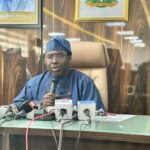The Electoral Forum has urged the Independent National Electoral Commission (INEC) to compel political parties to present regular audit reports of their accounts.
In a communiqué issued at the end of the seventh technical session of the organisation in Abuja, Nigeria’s capital, the forum said that INEC must also publish the audit reports after receiving them.
The Electoral Forum raised various concerns about elections in Nigeria and recommended strategies to improve the electoral process, ahead of the 2023 polls.
‘INEC should train ad hoc staff on the proper placement of the voting cubicles to ensure secrecy of the ballot and privacy in relation to the positions of party agents during the voting process’, the communique signed by the Chairman of the forum, Professor Adebayo Olukoshi, read.
‘The National Electoral Offences Commission should be an independent body and should not be subject to the Attorney General’.
The forum also urged INEC and anti-graft agencies to ensure that there was compliance with the provisions of the law on campaigns.
It said the media should aid in boycotting negative news, and hate speeches and ensure balanced coverage.
The forum added that mainstream and social media should be used to curb misinformation, disinformation and the issues pertaining to the misuse of media during electioneering.
‘In addition, banks and anti-corruption agencies such as ICPC and EFCC should be fully involved in monitoring campaigns and the electioneering period, and the media should spotlight more on policy-based campaigns by candidates and parties’, the communique added.
The forum underscored the importance of security in the electoral process and emphasised that peaceful and credible elections could only be possible through close collaboration between INEC and the security agencies.
Meanwhile, INEC says new registrants have not been included in the national register.
The commission was reacting to allegations by the Coalition of United Political Parties (CUPP) that INEC included foreigners in the register of voters.
‘The names were sourced from both within and outside Nigeria including some African countries such as Ghana, Cameroon, Zambia, Zimbabwe, Togo, Guinea, Gambia, and countries outside Africa, including Jamaica, Brazil and New Zealand’, the coalition claimed.
‘Significant among the discoveries in the register is the fact that majority of the foreign names were all born in 1983, despite whether their photographs showed they were old or young’.
But in a statement, the electoral body said it recognises and respects the right of citizens, either as individuals and groups, to demand accountability.
‘However, it is always important that caution is exercised so that such interventions do not unwittingly sow doubts in the public mind, thereby diminishing public confidence and trust in the electoral process’, INEC Commissioner for Voter Education, Festus Okoye, said in the statement.
It added, ‘For the avoidance of doubt, we restate the main components of these activities. First, the Commission is conducting a comprehensive Automated Biometric Identification System (ABIS) cleanup of the registration data by scrutinising every record.
‘Based on the Electoral Act 2022, any record that does not meet all the criteria for inclusion as stipulated in Section Ten, including the appearance in person by the registrant at the registration venue with proof of identity, age and nationality and our business rules requirements of adequate number of fingerprints and clear pictures, will be invalidated’.
Photo source: Yiaga Africa






